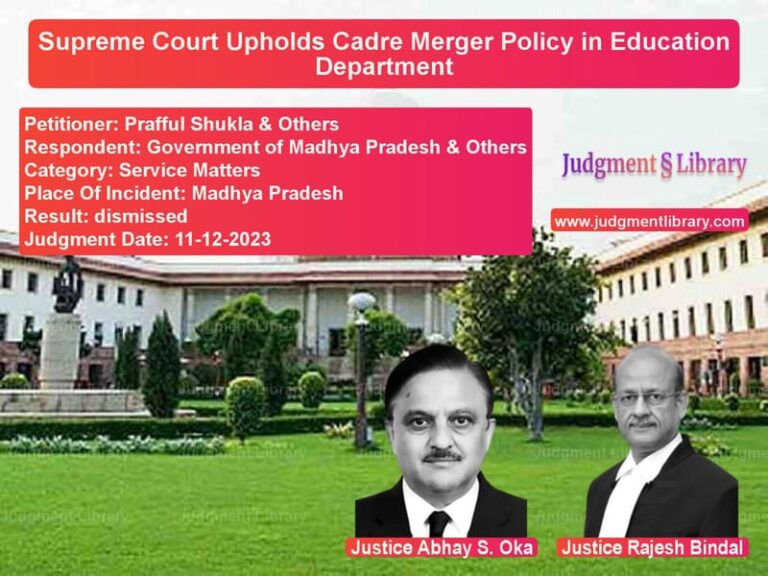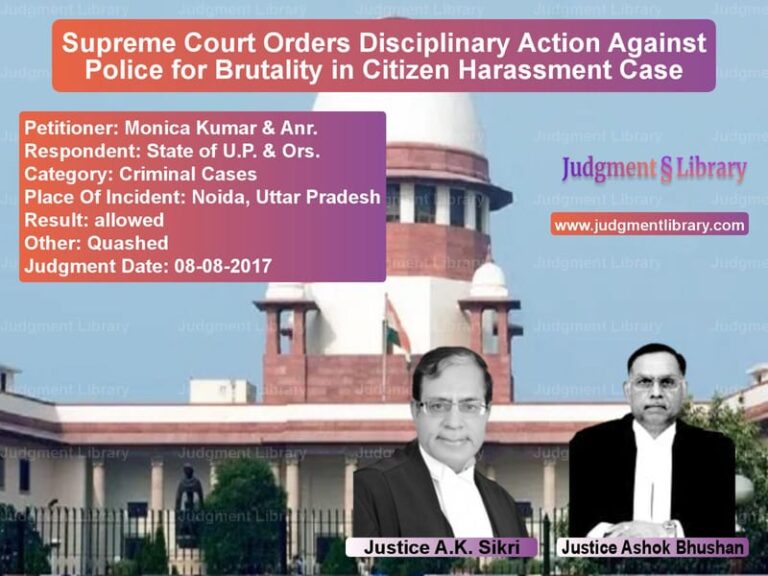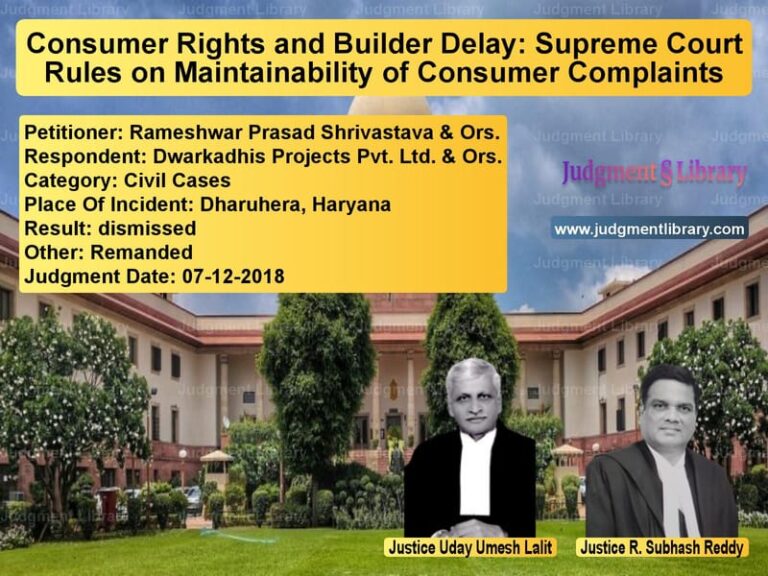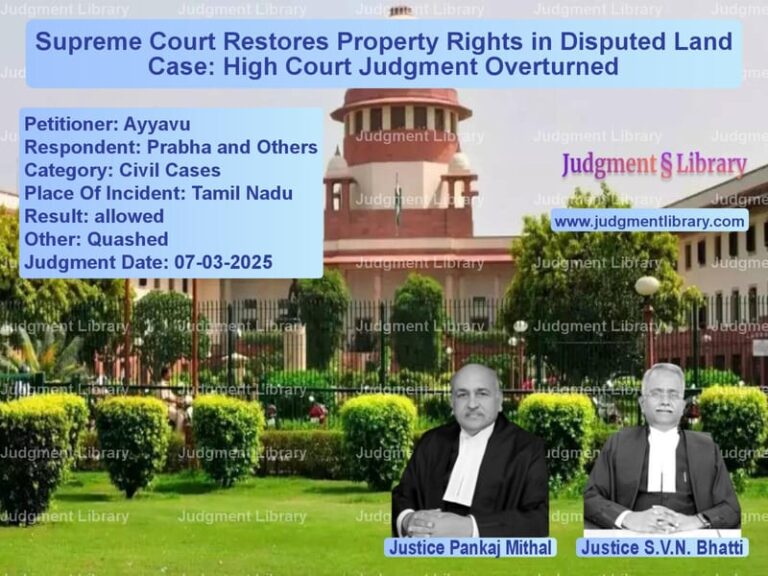Supreme Court Dismisses Appeal in Arbitration Award Challenge Due to Limitation
The Supreme Court of India recently ruled on the case of My Preferred Transformation & Hospitality Pvt. Ltd. & Anr. vs. M/S Faridabad Implements Pvt. Ltd., addressing the applicability of the Limitation Act, 1963, to an application filed under Section 34 of the Arbitration and Conciliation Act, 1996 (ACA). The Court held that the petition challenging the arbitral award was barred by limitation and dismissed the appeal.
Background of the Case
The dispute arose from a lease agreement between the appellants (My Preferred Transformation & Hospitality Pvt. Ltd.) and the respondent (M/S Faridabad Implements Pvt. Ltd.). The respondent invoked arbitration, leading to an arbitral award dated 04.02.2022, favoring the respondent.
The appellants received a scanned copy of the award by email on 04.02.2022 and a signed hard copy on 14.02.2022. As per Section 34(3) of the ACA, the limitation period for filing an application to set aside an arbitral award is three months from the date of receipt of the award. Thus, the three-month period expired on 29.05.2022. The additional 30-day condonable period expired on 28.06.2022, during the summer vacation of the High Court. The appellants filed their petition under Section 34 on 04.07.2022, the reopening date of the court.
Arguments Before the Supreme Court
Arguments by the Appellants
The appellants argued:
- Their petition was filed on the first working day after the High Court’s summer vacation.
- Section 4 of the Limitation Act, which allows filing on the next working day if the limitation period expires on a court holiday, should apply.
- Section 10 of the General Clauses Act (GCA) should also apply, as it allows filings on the next working day if a deadline falls on a holiday.
Arguments by the Respondents
The respondents countered:
- The appellants’ three-month limitation period ended on a working day (29.05.2022).
- The additional 30-day condonable period under Section 34(3) expired on 28.06.2022, during the court vacation, but this does not extend the limitation.
- Section 4 of the Limitation Act applies only when the primary limitation period expires on a holiday, not the condonable period.
- Section 10 of the GCA is inapplicable as the Limitation Act applies to arbitration proceedings.
Supreme Court’s Analysis and Judgment
1. Applicability of Section 4 of the Limitation Act
The Court held that Section 4 of the Limitation Act applies only when the “prescribed period” (three months) expires on a court holiday. Since the three-month period ended on a working day (29.05.2022), the appellants could not claim an extension under Section 4.
“The benefit of Section 4 of the Limitation Act is available only when the prescribed limitation period expires on a day when the court is closed.”
2. Inapplicability of Section 10 of the General Clauses Act
The Court ruled that Section 10 of the GCA does not apply to arbitration proceedings, as the Limitation Act governs them. The proviso to Section 10 states that it does not apply where the Limitation Act applies.
“Since Section 4 of the Limitation Act applies, Section 10 of the GCA stands excluded.”
3. Binding Precedents
The Court relied on previous decisions, including:
- Assam Urban Water Supply & Sewerage Board v. Subhash Projects & Marketing Ltd. (2012): Held that Section 4 of the Limitation Act applies only to the three-month period under Section 34(3) and not the additional 30-day condonable period.
- Bhimashankar Sahakari Sakkare Karkhane Niyamita v. Walchandnagar Industries Ltd. (2023): Confirmed that Section 10 of the GCA does not apply to Section 34(3).
4. Strict Interpretation of Limitation Period
The Court emphasized the strict nature of limitation under Section 34(3), which aims to prevent indefinite challenges to arbitral awards.
“The statutory scheme of the Arbitration Act mandates strict adherence to limitation periods to ensure finality in arbitration proceedings.”
Final Judgment
The Supreme Court dismissed the appeal, affirming the High Court’s decision:
“The appeal is dismissed. The Section 34 application was barred by limitation and rightly rejected by the High Court.”
Conclusion
This judgment reinforces the stringent interpretation of limitation in arbitration matters, ensuring that parties adhere to prescribed deadlines. It clarifies that courts cannot extend the 30-day condonable period beyond statutory limits and upholds the importance of finality in arbitration awards.
Petitioner Name: My Preferred Transformation & Hospitality Pvt. Ltd. & Anr..Respondent Name: M/S Faridabad Implements Pvt. Ltd..Judgment By: Justice Pamidighantam Sri Narasimha, Justice Pankaj Mithal.Place Of Incident: Delhi.Judgment Date: 10-01-2025.
Don’t miss out on the full details! Download the complete judgment in PDF format below and gain valuable insights instantly!
Download Judgment: my-preferred-transfo-vs-ms-faridabad-implem-supreme-court-of-india-judgment-dated-10-01-2025.pdf
Directly Download Judgment: Directly download this Judgment
See all petitions in Arbitration Act
See all petitions in Enforcement of Awards
See all petitions in Dispute Resolution Mechanisms
See all petitions in Judgment by P.S. Narasimha
See all petitions in Judgment by Pankaj Mithal
See all petitions in dismissed
See all petitions in supreme court of India judgments January 2025
See all petitions in 2025 judgments
See all posts in Arbitration and Alternate Dispute Resolution Category
See all allowed petitions in Arbitration and Alternate Dispute Resolution Category
See all Dismissed petitions in Arbitration and Alternate Dispute Resolution Category
See all partially allowed petitions in Arbitration and Alternate Dispute Resolution Category







